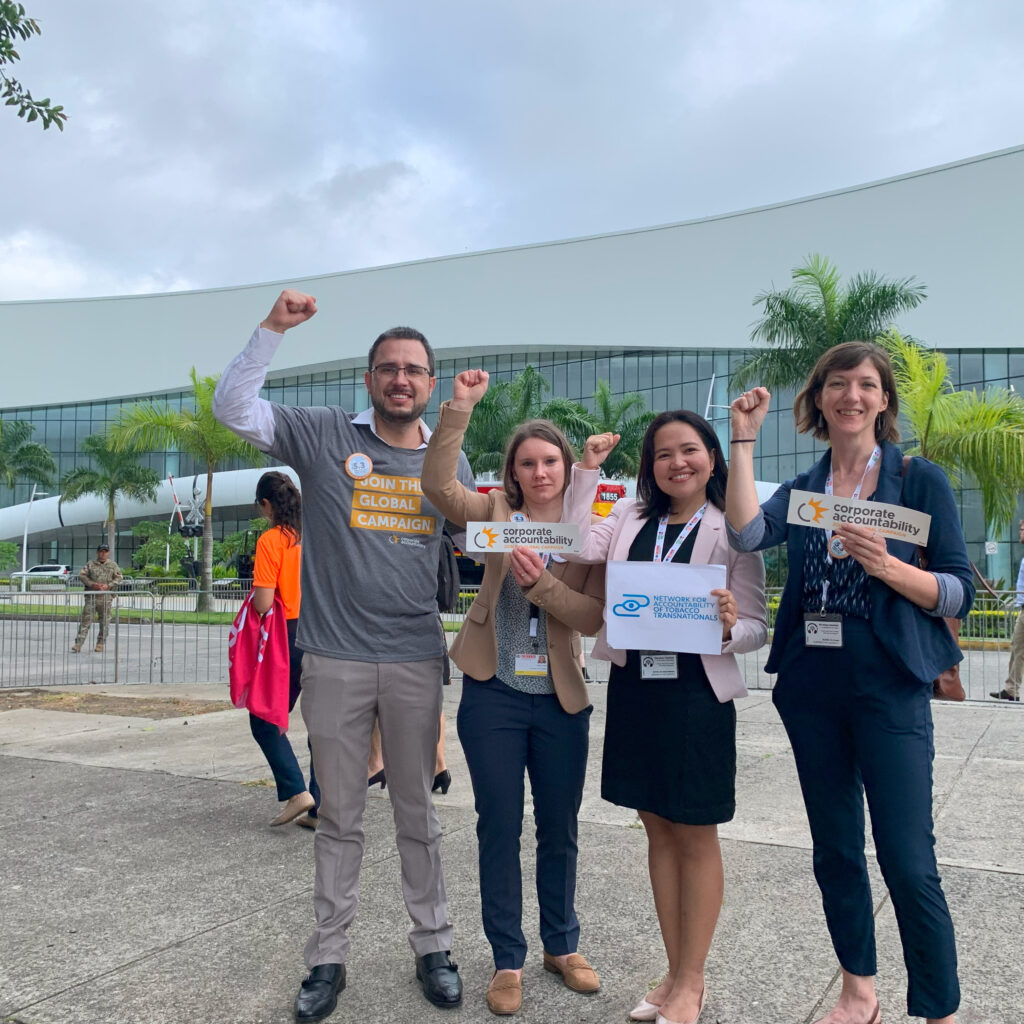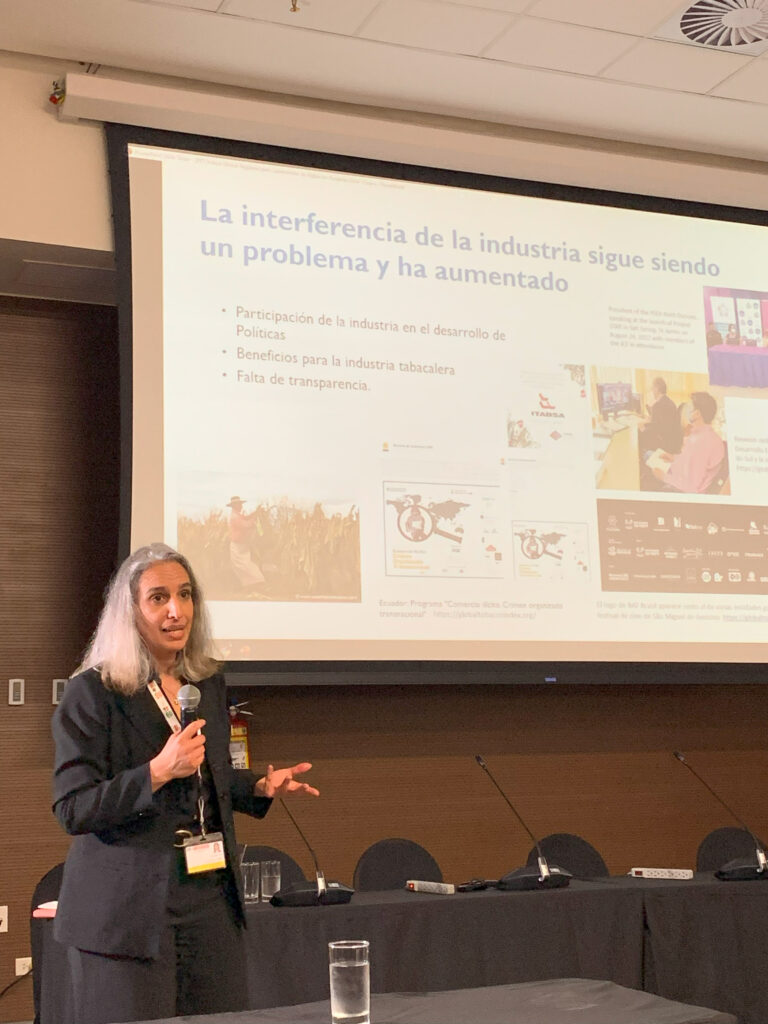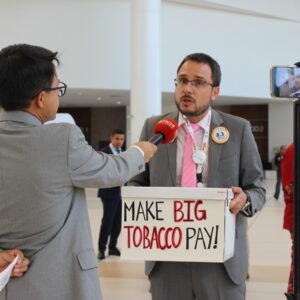This year, the global tobacco movement took a big step forward in making Big Tobacco pay for its decades of abuses: governments around the world passed a decision that will give countries the resources and tools to hold the industry legally liable.
I write this update after fiercely organizing with team members and allies from all over the world who are committed to holding Big Tobacco—one of the most damaging industries on the planet—accountable to its harm to our health, our lives, and our planet. Even up to the last moment, when government leaders told us that what we were asking for was too much, we stood firm and rooted in our core demand.
When I started challenging Big Tobacco abuses as a law student at my University in Colombia, I received a lot of push back from professors. They’d ask: why spend your time and thesis work on an industry that’s so powerful, built of corporations that have more money and power than many countries? To them, it seemed impossible to imagine a world where governments have the power to hold the tobacco industry liable.
But I stayed committed to the topic, inspired by many other tobacco control advocates that believed in its potential, particularly my late dad, who used to be the Latin America Director at Corporate Accountability. He was the one who introduced me to the global tobacco treaty provision around liability. This victory proves yet again that we’re building that world, together.
Article 19: Precedent-setting international policy for tobacco liability

With allies from around the world, Corporate Accountability has organized to kick Big Tobacco out of the tobacco treaty meetings for almost two decades. Pictured from left: Corporate Accountability organizers Daniel Dorado, Keltie Vance, Corporate Accountability board member Irene Reyes, and Corporate Accountability media consultant Renee Sladja.
This victory for making Big Tobacco pay is centered on Article 19, a provision in the treaty that encourages and supports countries in initiating and advancing legal cases against Big Tobacco corporations, like Philip Morris International (PMI) and British American Tobacco (BAT). Article 19 gives countries a way to secure justice against an industry that poisons millions of people every year and pollutes our air, water, and land.
Article 19 also serves as a model for people, governments, and international policymaking organizations to hold transnational corporations accountable for other abuses-– from fueling the climate crisis to overwhelming the ocean with plastic pollution.
Below, I break down why we and our partners are committed to Article 19, what we did to ensure that this part of the global tobacco treaty is a priority in years to come, and how this decision will make it more possible for impacted communities around the world to access justice.
Making Big Tobacco pay for its trillion-dollar price tag
Big Tobacco is one of the most damaging industries on the planet. Its billions of dollars in profits have a devastating cost.
Although it’s difficult to quantify the exact dollar amount that people and governments pay to cover the harms caused by Big Tobacco, the numbers we do have are staggering:
- Annual tobacco-related healthcare costs globally are estimated at US $422 billion.
- The broader economic cost of tobacco’s impact is estimated at US $1.85 trillion.
- In China alone it costs $2.6 billion to clean up tobacco product waste.
- In Brazil, 361,827 hectares of land are dedicated to tobacco farming, land that could be used to grow food.
What if instead of the government bearing all these costs, BAT and PMI had to hand in the profits that they’ve earned off this immense suffering? And those funds went to exorbitant healthcare costs, environmental cleanup, and more?
Article 19 is the first step toward making that world—where corporations pay for what they’ve broken—a reality.
Giving countries what they need to put Article 19 into action
Up until now, Article 19 has been underutilized; a measure that primarily existed in the global tobacco treaty text with very few governments taking up cases against Big Tobacco.
We and our allies knew that for Article 19 to be a realistic pathway to justice for countries, this needed to change. We needed the parties to the global tobacco treaty, a treaty negotiated under the World Health Organization (WHO), to put more support behind it. The core part of that support is a group of experts responsible for guiding countries through the legal process and providing legal expertise and recommendations along the way.
That’s why we and our allies campaigned to turn the mission of making Big Tobacco pay into a rallying cry during this year’s tobacco treaty meetings in Panama. For months, we organized in partnership with tobacco control experts and activists from around the world who all believe in the untapped potential of Article 19. The path was not easy. We were reluctant to pressure government decision-makers to commit to the support and funds we knew that article 19 needed to succeed, in fear that they would think it was too much and reject us outright.

Laura Salgado, of Global Center for Good Governance on Tobacco Control, shares findings from the Latin America Tobacco Industry Index, which analyzes data on how well countries in the region are protecting public health policy from Big Tobacco’s influence.
But we didn’t let those fears stop us. With Global Center for Good Governance in Tobacco Control, Action on Smoke and Health, and activists from the Network For Accountability For Tobacco Transnationals, among other tobacco control allies, we met with government delegates across Asia and Latin America, and the Global Tobacco Treaty Secretariat, to make the case for strengthening liability measures included in the global tobacco treaty. We secured media coverage about the potential of Big Tobacco liability in more than a dozen countries. And we urged our network of members and activists to join the demand to make Big Tobacco pay, garnering thousands of signatures.
When we arrived in Panama for this year’s meetings, we were ready. We used our momentum to keep liability a leading topic in and outside of the negotiating halls. We created space for governments pursuing accountability to share their stories. And we delivered the signatures representing thousands of people calling for industry liability to the COP10 delegates.
All this power carried us through the contentious negotiation process, where many leaders worried that additional support for Article 19 would be too costly. In the last moment of the talks, representatives from more than 15 countries—many of whom we and our allies met months before—spoke passionately about Article 19, and why we needed to give it more support. Their demand was clear: It’s time to make Big Tobacco pay. And formalizing Article 19 into the global tobacco treaty was a crucial step toward making that happen.
Thanks to the steadfast support of our partners, and the thousands of people around the world demanding that Big Tobacco pay–the decision passed!
The power of collective action and the road ahead
I’m thrilled about the many possibilities that the decision opens. But most of all, I’m heartened by what this moment proves: when people come together across countries and backgrounds and organize toward a vision that we believe in, we win.
With your support, we will stay vigilant, and we will keep organizing toward a vibrant world where people have what they need to live and thrive in community with others.







